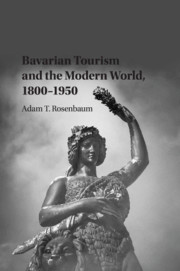Description
Bavarian Tourism and the Modern World, 1800–1950
Publications of the German Historical Institute Series
Author: Rosenbaum Adam T.
This book examines the connections between Bavarian tourism and the turbulent experience of German modernity for Germans and foreign tourists.
Language: English
Subject for Bavarian Tourism and the Modern World, 1800–1950:
Approximative price 31.58 €
In Print (Delivery period: 14 days).
Add to cart
Bavarian Tourism and the Modern World, 1800-1950
Publication date: 03-2020
Support: Print on demand
Publication date: 03-2020
Support: Print on demand
Approximative price 104.06 €
In Print (Delivery period: 14 days).
Add to cart
Bavarian Tourism and the Modern World, 1800-1950
Publication date: 02-2016
290 p. · 15.8x23.5 cm · Hardback
Publication date: 02-2016
290 p. · 15.8x23.5 cm · Hardback
Description
/li>Contents
/li>Biography
/li>
During the nineteenth and early twentieth centuries, the tourism industry of Bavaria consistently promoted an image of 'grounded modernity'. This romanticized version of the present reconciled continuity with change, tradition with progress, and nature with science. In an era of rapid and unprecedented change, simultaneously nostalgic and progressive grounded modernity produced an illusion of continuity. It helped make the experience of modernity more tangible by linking impersonal and abstract ideas, like national identity, with familiar experiences and concrete sights. Bavarian Tourism and the Modern World, 1800?1950 examines the connections between Bavarian tourism and the turbulent experience of German modernity during this period. It gauges Germany's long and often unsettling journey to modernity using Bavarian tourism and travel as a lens. Closely examining guidebooks, brochures, postcards and other tourist propaganda, Adam Rosenbaum argues that by pointing visitors to the past, tourism illuminated the present, and produced signposts to the future.
Introduction; 1. A brief history of German travel; 2. Landscape tourism in Franconian Switzerland; 3. Nature, modernity, and the spa culture of Bad Reichenhall; 4. The Augsburg tourism industry and the German past; 5. The Nazified tourist culture of Munich and Nuremberg; Epilogue.
Adam T. Rosenbaum is an Assistant Professor of History at Colorado Mesa University, where he teaches courses on European and Asian history.
© 2024 LAVOISIER S.A.S.




